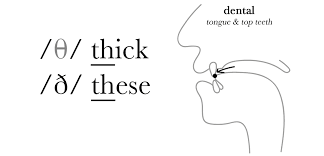Now if there is a ‘th' in the middle of a word, before a consonant, it's usually unvoiced.
如果‘th’位于词中,且在辅音之前,那通常是清辅音。
bathtub, faithful, worthless
浴缸、忠诚的、无价值的
And a ‘th' at the end of a word is usually unvoiced.
‘th’位于词尾也通常是清辅音。
month, strength, warmth, teeth, fifth
月份、力量、温暖、牙齿、第五
There are some exceptions though.
但也存在一些例外。
And I'm going to talk about those in just a minute.
我马上就会讲到例外情况。
Now the voiced ‘th' sound made using your vocal cords.
‘th’发浊辅音需要用到声带发音。
So if there's a ‘th' at the beginning of a structure word, they're usually voiced.
‘th’位于结构词汇的词首,通常是浊辅音。
So structure words, sometimes called function words, are different to content words
结构词汇有时也叫功能词汇,与实义词不同,
because they don't have a lot of meaning in English sentences.
因为它们在英语语句中没有多少意思。
They're grammatical words.
它们是语法词汇。
They don't tell us a lot of information but they're important to the structure of English sentences.
这些词汇无法传达很多信息,但对英语句子的结构非常重要。
So structure words are words like:this, that, those, these, the, there, then, than
比如:这、那、那些、这些、特指the、那里、然后、比
So all of these words, I mean, some of these words are very, very, common English words, right?
这里面有很多单词在英文中都非常常见,对吧?
They're very, very common.
非常、非常常见。
So learning to pronounce the different ‘th' sounds is really important if you want to sound natural when you speak English.
如果你想让自己的英语口语听起来更加自然,学会不同的‘th’发音很重要。

There is a noticeable difference.
有一个显著差别。
Now a ‘th' in the middle of the word, when it's between two vowel sounds is usually this voiced sound.
‘th’位于词中,且处于两个元音之间,通常是浊辅音。
bother, worthy, mother
打扰、值得的、母亲
Now I said the ‘th' is usually unvoiced at the end of words
我说‘th’位于词尾通常是清辅音,
but except if the word ends in ‘-the' like:
但例外情况就是以‘the’结尾的单词,比如说:
bathe,breathe and loathe
洗澡、呼吸和厌恶
So these are pretty good guides but there are always exceptions, aren't there?
这些都是非常好的技巧,但总有例外,对吧?
English!
英语呀!
There are exceptions like:smooth, and clothes, and frothy
有一些例外情况,比如:平缓的、衣服、有泡沫的。
All of these words are breaking the rules and there are more!
这些词汇都打破了规则,而且还有更多例外。
Actually if you can think of any more, please add them to the comments so that we can talk about some of the exceptions in the comments.
实际上,如果你能想到更多例外的词汇,就写在评论区里,我们就可以在评论区中讨论其中的一些例外了。
But anyway, now that you've got through most of these guidelines, it's time to practise.
无论如何,你们想在已经了解了大部分技巧了,那就该练习了。
So I want you to repeat after me.
我想你们跟着我一起读。
Throw those things
扔掉那些东西。
Throw those things to Theo.
把那些东西扔给西奥。
Throw those things to Theo.
把那些东西扔给西奥。
There are three of them
有三个人
There are three of them over there.
那边有三个人。
There are three of them over there.
那边有三个人。
Ready for this one?
准备好读这句了吗?
At three thirty on Thursday
在周四三点半
At three thirty on Thursday, a thousand of those thrilling thinkers will gather.
在周四三点半,一千名激动人心的思想家将汇聚一堂。
At three thirty on Thursday, a thousand of those thrilling thinkers will gather.
在周四三点半,一千名激动人心的思想家将汇聚一堂。
I love tongue twisters!
我喜欢绕口令!
Can you think of your own ‘th' tongue twister?
你能想出你自己的‘th’绕口令吗?
I think I thought I..
我认为,我觉得,我……
If you can think of one, put it in the comments so that we can all practise together.
如果你能想出一条,写在评论区里,我们可以一起练习。
Put your ‘th' tongue twisters right down in the comments and let's practise!
把你的“th”绕口令写在下方的评论区,让我们一起练习吧!
What a workout! Well done to you!
多好的锻炼啊!你真棒!
I mean your tongue might feel a little exhausted after that so you can take a break now.
你的舌头肯定有点累坏了了,所以你现在可以休息啦。
But make sure that you come back to this lesson tomorrow or the next day and practise again.
但是明天或者是后天一定要回顾一下这节课,再练习一次。
It's just like doing sit-ups right?
这就像做深蹲一样,对吗?
Each time you do it, it will get a little bit easier.
你每做一次,就会变得越来越简单。
Well that's it for this lesson!
好的,这节课的内容就这么多啦!
I really hope that you enjoyed it.
希望你们喜欢。
Please make sure you give it a ‘like' and subscribe to my channel because I make new lessons here, every single week.
一定要给我点赞,并我的频道哦,因为每周我都会在这里发布新的课程。
Thanks for watching and I'll see you in the next lesson!
感谢观看,下节课见!












